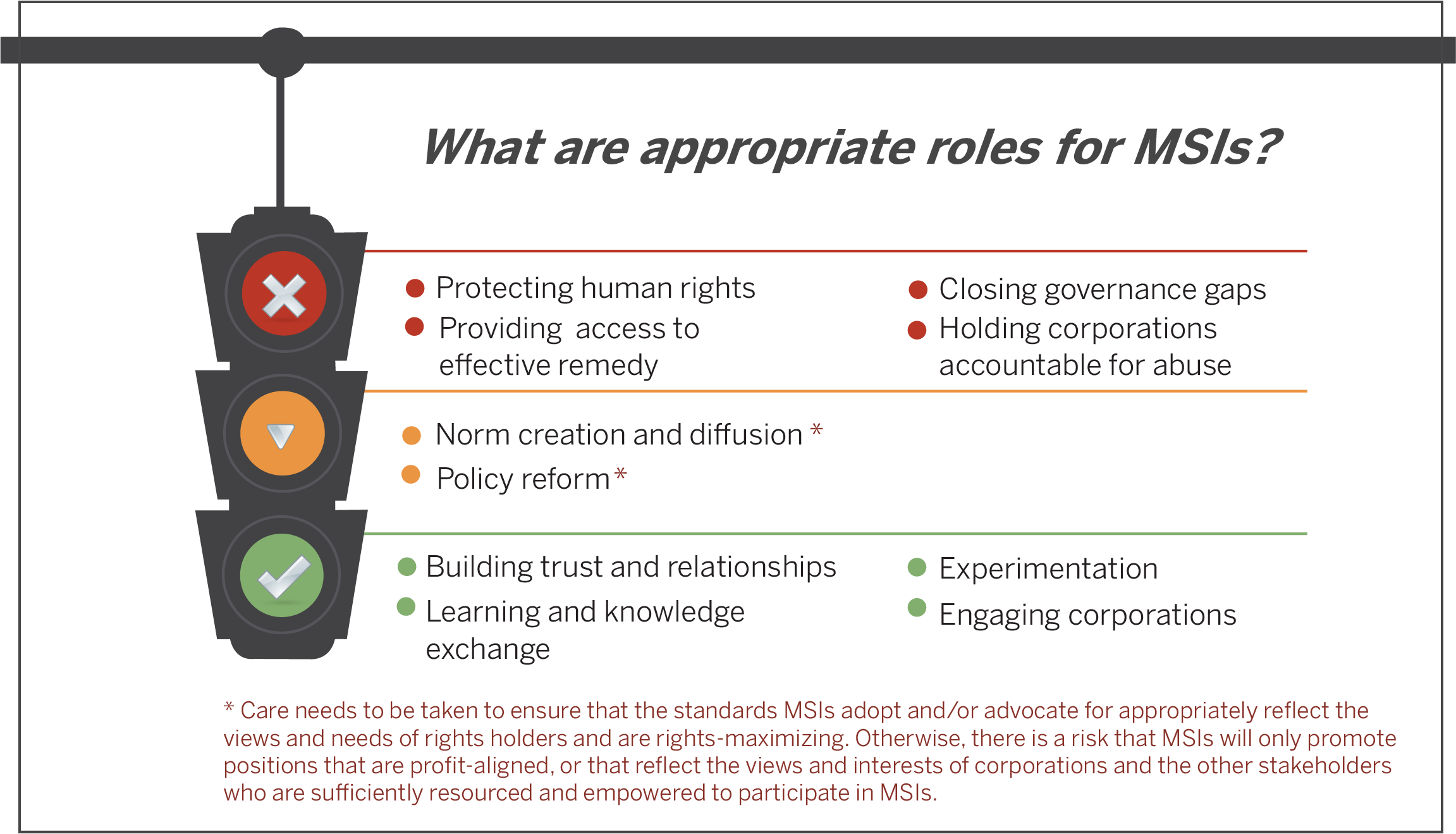A Way Forward
The lessons from our research into MSIs suggest that two major steps need to be taken in order to address corporate-related abuses and provide meaningful rights protection.
1. Rethink the Role of MSIs
MSIs should be recognized for what they have been equipped to do well: to be forums for building trust, experimentation, and learning. However, they should no longer be viewed as institutions that robustly ensure that their corporate members respect rights, provide access to remedy, or hold corporations accountable for abuses. Regulation is needed for these purposes.
To the extent that any form of private governance can be effective in these protection or accountability realms, such mechanisms need to be rights holder-centric and address corporate power such that the regulated entity is not controlling the institution, neither formally nor informally. This is possible, as these are the bedrock principles of Worker-driven Social Responsibility (WSR) initiatives that have emerged as counterpoints to MSIs. WSR initiatives are designed by and for workers and include legally enforceable standards. Read more in the full report.

The presence of an MSI, or any form of private governance, should not be a substitute for public regulation. MSIs do not eliminate the need to protect rights holders from corporate abuses through effective regulation and enforcement. To the contrary, the existence of an MSI should put governments—as well MSIs and their supporters—on notice that a governance gap exists, and that they need to supplement the voluntary efforts of that MSI with mandatory measures at local, national, and international levels.
This is what it means in the United Nations Guiding Principles on Business and Human Rights to have a “smart mix” of measures: not that voluntary efforts, such as MSIs, can replace mandatory efforts, or vice-versa, but rather that the two must work alongside each other. An evolving web of human rights protections, built from a strong foundation of public regulation and supplemented by voluntary efforts that aim to raise the floor of regulation, will offer greater protections for rights holders.
Read more in the full report
2. Challenge the Corporate Form
Major corporations avoid sharing power with other stakeholders—such as rights holders and affected communities—because to do so threatens their obligations to shareholders and their accumulation and management of profit. And as long as corporations are primarily beholden to investors, they will resist transformational human rights and environmental justice initiatives that jeopardize their profits or power.
Why? Because companies are run and controlled by a board of directors, executive management, and shareholders, who do not directly experience the on-the-ground consequences of the company’s decisions. They are not the people who live near or work in the mine sites, farmland, or factories where the repercussions of business practices reverberate. This, combined with the fact that boards are legally prohibited from making decisions that prioritize community or societal interests above the financial interests of shareholders, means that decision makers in a corporation are neither structurally situated nor primarily motivated to consider human rights impacts. Instead, companies are incentivized—and often obligated—to make whatever decisions will maximize shareholder profits, without sharing those returns with workers or affected communities. This has caused extreme economic inequality between those who own or run companies and those who do not.
Therefore, perhaps the most significant human rights project is one that has received little attention within the human rights domain: challenging the corporation itself and reimagining our economic enterprises. To us, this means developing and promoting business models and policy transformations whereby:
- Workers and/or affected communities are at the center of decision-making; and
- Benefits and ownership accrue to the workers who generate value for a business and/or to the communities and rights holders who are impacted by its behavior.
These propositions raise important human rights questions that need urgent attention. There is much to learn from the workers, movements, and individuals who have long been creating and promoting resilient alternatives to the corporation in pursuit of a just, sustainable, and new economy. This is why MSI Integrity in the coming months will embark on a new direction: taking lessons from the grand experiment in multi-stakeholderism about how to move beyond the existing corporate form. For more information, see Beyond Corporations.
Read more in the full report.
